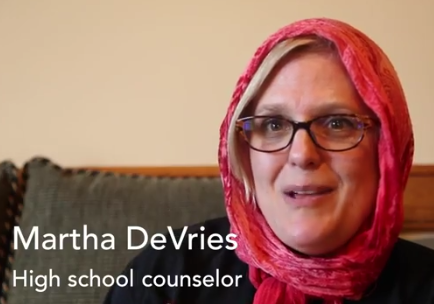KANSAS CITY, Kan. – North Kansas High School guidance counselor Martha DeVries decided to wear a hijab to work every Monday for six months because she felt compelled as a Christian to support Muslims.
“I’ve just gotten very tired of hearing so many negative things, like Donald Trump’s ‘let’s not let Muslim immigrants into the United States’ and the scare on Syrian refugees,” DeVries, who is also a Baptist youth minister, told Baptist News Global.
MORE NEWS: Know These Before Moving From Cyprus To The UK
“I’m a follower of Jesus. I do believe that I am called to live out His message. I believe that the most important commandment is ‘love God and love others,’” the 47-year-old told the Religious News Service. “It’s not my intent to take on the establishment of the entire Islamic faith, it’s my intent to say I stand with Muslim women in my community.”
DeVries’ quest to bring acceptance and love to Muslim women by wearing a hijab is one of the most recent in a movement of non-Muslims women donning the religious covering in a show of solidarity. Students, schools and workplaces are increasingly hosting “wear a hijab” days for non-Muslim women.
But two Muslim women from Egypt and India who recently penned an editorial for The Washington Post believe those types of efforts could be doing more harm than good.
“This modern-day movement spreads an ideology of political Islam, called ‘Islamism,’ enlisting well-intentioned interfaith do-gooders and the media into promoting the idea that ‘hijab’ is a virtual ‘sixth pillar’ of Islam, after the traditional ‘five pillars’ of the shahada (or proclamation of faith), prayer, fasting, charity and pilgrimage,” the women wrote.
“This modern-day movement, codified by Iran, Saudi Arabia, Taliban Afghanistan and the Islamic State, has erroneously made the Arabic word hijab synonymous with ‘headscarf.’ This conflation of hijab with the secular word headscarf is misleading. ‘Hijab’ literally means ‘curtain’ in Arabic. It also means ‘hiding,’ ‘obstructing’ and ‘isolating’ someone or something. It is never used in the Koran to mean headscarf.”
The women continued.
MORE NEWS: How to prepare for face-to-face classes
“To us, the ‘hijab’ is a symbol of an interpretation of Islam we reject that believes that women are a sexual distraction to men, who are weak, and thus must not be tempted by the sight of our hair. We don’t buy it. This ideology promotes a social attitude that absolves men of sexually harassing women and puts the onus on the victim to protect herself by covering up,” they wrote.
It’s unclear if DeVries is familiar with the different Muslim factions, or if she knows she’s supporting a more conservative and oppressive interpretation of Islam. She told the Religion News Service she simply wants Muslims to know there are “Christians in this nation who love them.”
“What’s a headscarf? I mean, it’s three yards, if even,” she said. “That shouldn’t separate me from someone whose humanity is so much like mine.”
DeVries has worn the hijab every Monday since December and plans to continue through May. She thinks the Muslim students at North Kansas High School appreciate her efforts because they often give “knowing looks” and “appreciative smiles,” the Christian Post reports.
“Especially on Mondays when I am wearing the hijab, I feel like I get knowing looks from Muslim students and appreciative smiles but I could just be imagining that too,” DeVries stated. “I figure one of these days, some girl is going to come to me and say you are not wearing that scarf correctly, let me show you how to put it on your head but so far, that hasn’t happened.”


Join the Discussion
Comments are currently closed.